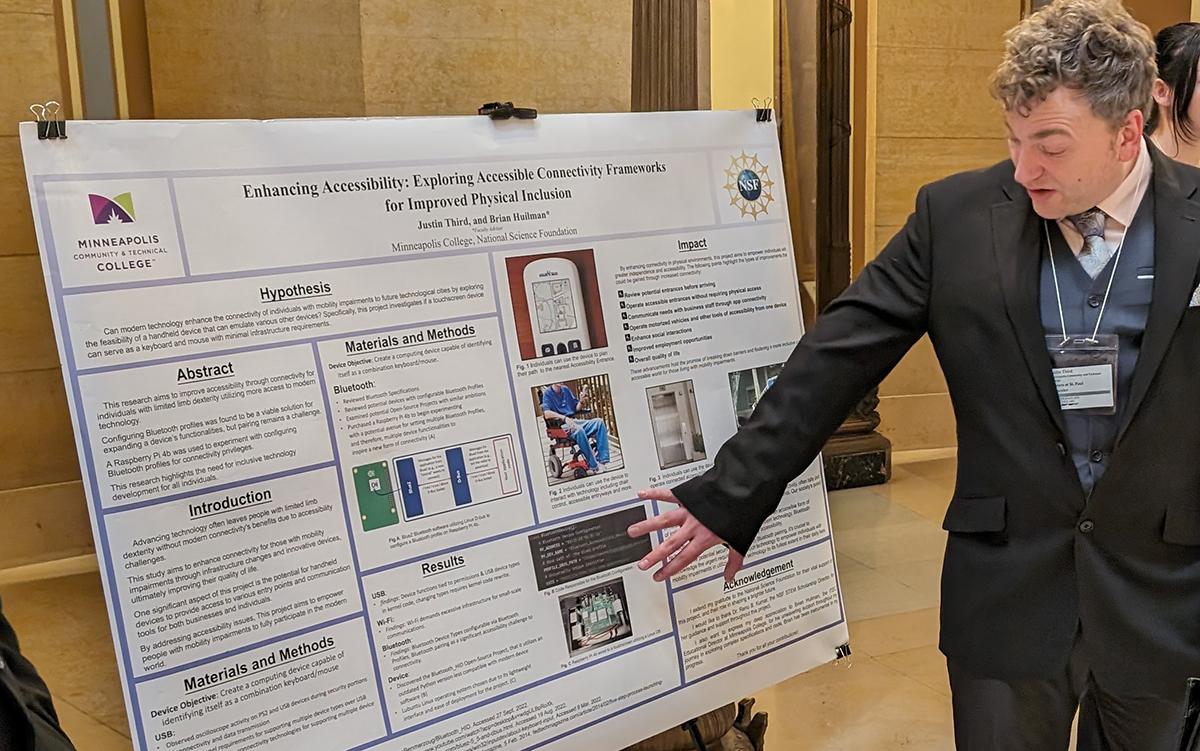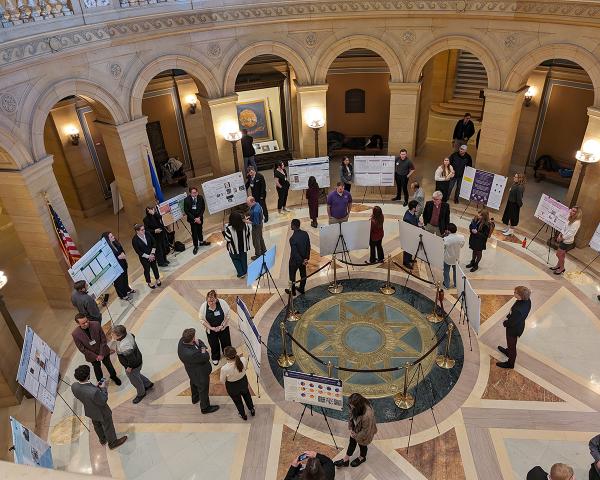Transformative Research Opportunities
A long tradition at Minneapolis College is offering transformative research opportunities focusing across disciplines within its STEM programming. Research opportunities not only prepare students for transfer to four-year universities, they support building strong communication, critical thinking, and analytical skills, boosting students’ confidence and awareness through experiential learning, preparing them for future academic work and lifelong careers.
Research opportunities at Minneapolis College start both in and outside of the classroom. Upon completion, student’s share their research at academic conferences and seminars and have their work published. They impact change on multiple levels.
Some of the research within Minneapolis College is supported by the U.S. National Science Foundation (NSF), Louis Stokes North Star STEM Alliance (LS-NSSA), and the 3M Foundation. The NSF, for example, is an independent federal agency that supports science and engineering in all 50 states and U.S. territories in an effort to spark new ideas and creative approaches that can accelerate discovery and transform knowledge into tangible benefits to society.
A Passion for Microbiology
“I’ve been given the opportunity to conduct research in the microbiology department under the great guidance of my advisor and mentor Renu Bhagat Kumar,” said Minneapolis College student Eva Skipwith. “Researching antibiotic resistant bacteria from the aquatic environments of Minnesota, Renu Bhagat Kumar introduced me to my passion for microbiology while also teaching me the foundation and principles of research. These experiences have helped me feel prepared and excited to pursue graduate school in the future. They have even given me extra confidence in my current STEM classes.”
Skipwith shared how being able to conduct research is just one of the many great privileges of being in the NSF program. “With the constant support and encouragement from Dr. Kumar, I was given a chance to build my academic plan for my career as a future scientist in multifaceted ways. One example is having the opportunity to be the first in my family to present research at national conferences such as those in Washington, D.C, while also supporting the work of other scientists. The program and support it provided has given me confidence to know my hard work and academic strengths are noticed, celebrated, encouraged, and are set to finish with upstanding support and success.”
Disability Advocate Creates Accessibility Tool Using USB Technology
After experiencing challenges with his own dexterity and witnessing a neighbor’s daily struggles navigating life from a wheelchair, alum Justin Third, who is known as a disability advocate, became acutely aware of the possibilities of technology to change someone’s life while studying at Minneapolis College. “Many people who navigate life with a disability have challenges that are often invisible to the people around them,” said Justin Third, who aspires to be an advocate for disability rights throughout his lifetime.
And Third’s opportunity to make a larger impact on the lives of people with disabilities arrived when he was chosen by the NSF to receive a grant to support the research, design, and creation of an accessibility tool using USB technology while he was studying at Minneapolis College.
“Minneapolis College not only provided me the platform to pursue my passion in technology, it also challenged me to push my boundaries in academia,” said Third. “Through the unwavering support of ITEC faculty and department chair Brian Huilman, and the backing of the NSF, I delved deep into accessible Bluetooth research, leading to discoveries with the real potential to improve quality of life.”

The research opportunity empowered Third to present his groundbreaking research at the Minnesota State Capitol and at the inaugural NSF Scholars Meeting in Washington, D.C. More than 1,000 scholars and organizations attended. “I can’t thank NSF enough for their support,” said Third. “I truly am a bigger version of myself for the many opportunities this program gave me.”
Biol 2205 Genetics - Gene Mapping
“Having a research opportunity as part of a course makes it easier for all students to build their research skills and do real, interesting science,” said faculty member Maire Sustacek. “I thoroughly enjoy working with my BIOL 2205 Genetics students, for example, to map insulin signaling genes. We also work with the Genomics Education Partnership to submit students’ work for publication and to-date, we have submitted 19 gene annotation projects for publication with 18 students serving as co-authors.”
One the students, Jesus Romero Lopez, presented his research entitled “DENR: Finding Orthologs in Drosophila Species” which detailed the annotation and phylogenetic analysis of the DENR gene in several Drosophila fruit fly species at St. Catherine University Genomic Research Symposium. DENR is important for insulin signaling in flies, and this work helps build our understanding of how insulin signaling genes evolve over time.
The National Science Foundation Grants
The NSF awarded Minneapolis College grants to improve Science, Technology, Engineering, and Mathematics (STEM) scholastic and career opportunities for low-income students are under the direction of Kumar.
Still going strong, the project, "Collaborative Research: Partner Relationships to Increase STEM Momentum through Transfer Transition," is a collaboration with other higher institutions led by Augsburg University, with a combined budget of $5 million.
“This project contributes to a national commitment to advance well-educated scientists, mathematicians, engineers, and technicians,” said Kumar. “Undergraduate research and internship experiences provided in transfer pathways support professional development through cross-institutional partnerships and workforce development programs.”
Kumar, along with Minneapolis team members Carmen Buhler, Dean Ben Weng, and faculty from collaborating institutions like Augsburg University work together to create support structures through mentoring, advising, and improved transfer pathways. High achieving students who have financial need are participating in the initiative to secure opportunities for bachelor’s degrees in biology, chemistry, computer science, engineering, food science, mathematics, and physics.
“Research provides collaborative opportunities for students to be involved in exploring important questions in meaningful and valuable ways advancing knowledge and innovation in all fields,” said Kumar, who recognizes offering research opportunities can improve academic performance, retention, and persistence. “As the world evolves, the need for research grows. Minneapolis College has a long tradition of offering research projects to transform the educational experience for its students and prepare them for their future.”
